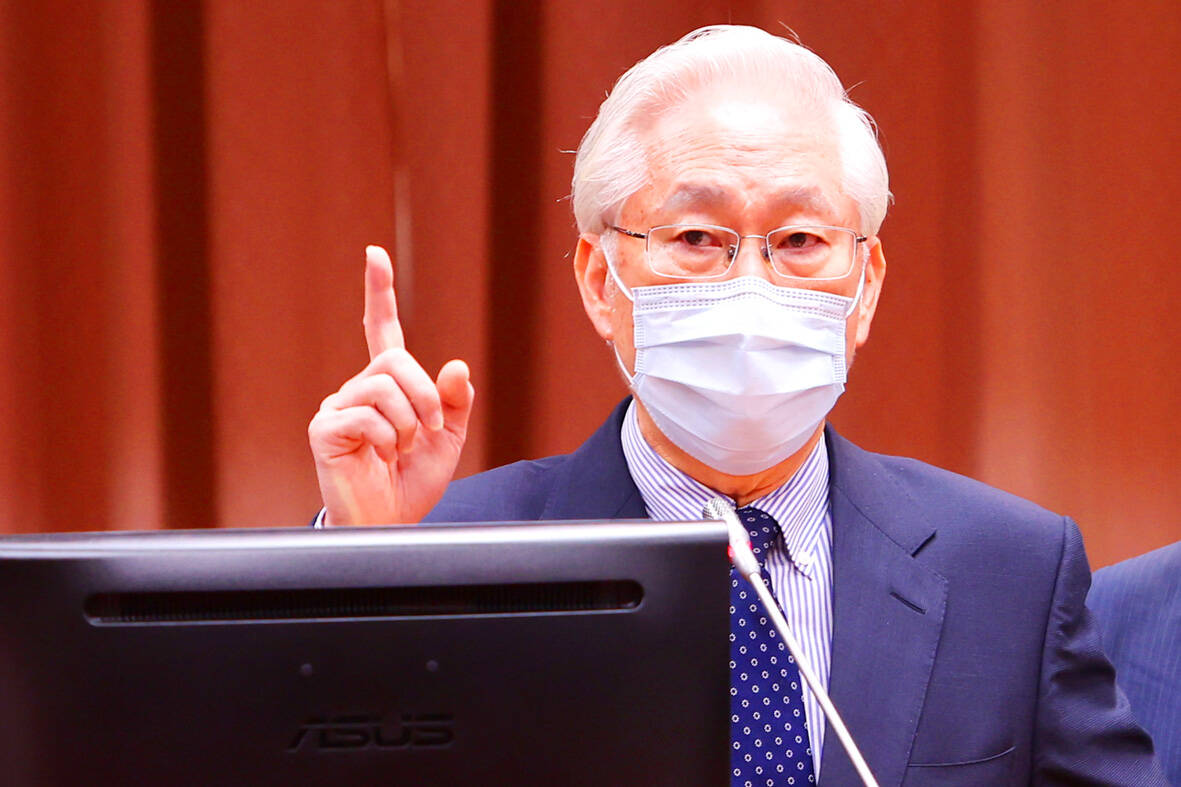Minister Without Portfolio Wu Tsung-tsong (吳政忠) yesterday called for the development of a third-party verification and certification system for chips installed in the GPS and flight control systems in drones, after drones used in last month’s Double Ten National Day celebrations in Chiayi County were found to have been manufactured in China.
Wu, who also serves as National Science Council minister, made the remarks during a meeting of the legislature’s Education and Culture Committee, which was scheduled to review the council’s budget plan for the next fiscal year.
Democratic Progressive Party (DPP) legislators Chang Liao Wan-chien (張廖萬堅) and Ho Him-sun (何欣純) focused on cybersecurity and national security issues related to drone use, after Chinese Nationalist Party (KMT) Legislator Lu Ming-che (魯明哲) on Tuesday said that drones used during the celebration included components made in China.

Photo: CNA
“Our understanding is that motors, batteries and outer casings of the drones were manufactured in China. Chips in the drone’s flight control system were made by a European manufacturer, but chips in the drone’s GPS system were made by Qualcomm. If the drone operator is telling the truth, the drones should not be transmitting data to China,” Wu said.
“We have dispatched experts to investigate and collect data, which will then closely be examined by the National Center for Cyber Security Technology,” he said.
Wu told reporters on the sidelines of the committee meeting that Taiwan has an advantage in developing drones, and drone-related cybersecurity verification and certification systems.
“Because Taiwan is a democratic country, our cybersecurity-proof products, including chips, can be supplied to the global market. Our certification and verification standards will be in sync with those in other countries,” he added.
“Taiwan has yet to have a verification and certification institution for drones and drone-related products. However, the Executive Yuan has plans to establish such a mechanism, either by entrusting the task to the Telecommunication Technology Center under the Ministry of Digital Affairs or by having a third-party verification system,” he said.
Taiwan Drone 100, which performed the drone show, said that it largely relies on Chinese suppliers for non-cybersecurity-related drone components because of costs and market factors, adding that this is an issue facing all operators in the global commercial drone industry.
However, the company said that it developed the core flight control system itself, adding that other countries do not have a cybersecurity certification system developed for drones either.
The National Communications Commission (NCC) yesterday confirmed that Taiwan Drone 100 have secured certifications for radio frequency device modules on April 10, 2020, for the two types of drones that it produced, adding that the drones used unlicensed frequency bands in 2.4 gigahertz and 5.8 gigahertz.
“Our certification is to ensure that their drones will not cause radio wave interference when other electric products are in use. It is not a cybersecurity certification,” NCC Deputy Chairman and spokesman Wong Po-tsung (翁柏宗) said.
Separately, the NCC said that it is working with Meta Platforms to facilitate the importation of the Quest Pro Virtual Reality headset into the country.
“The headsets will use frequency bands between 5,925 megahertz and 7,125 megahertz, which the government has not opened for commercial use. To secure radio frequency certification, Meta will need to disable the device from accessing the frequency bands,” Wong said.
Wong said that the commission received about 80 complaints from consumers who had purchased headsets from Meta about the delay in obtaining customs clearance for their orders.

The Coast Guard Administration (CGA) yesterday said it had deployed patrol vessels to expel a China Coast Guard ship and a Chinese fishing boat near Pratas Island (Dongsha Island, 東沙群島) in the South China Sea. The China Coast Guard vessel was 28 nautical miles (52km) northeast of Pratas at 6:15am on Thursday, approaching the island’s restricted waters, which extend 24 nautical miles from its shoreline, the CGA’s Dongsha-Nansha Branch said in a statement. The Tainan, a 2,000-tonne cutter, was deployed by the CGA to shadow the Chinese ship, which left the area at 2:39pm on Friday, the statement said. At 6:31pm on Friday,

The Chinese People’s Liberation Army Navy’s (PLAN) third aircraft carrier, the Fujian, would pose a steep challenge to Taiwan’s ability to defend itself against a full-scale invasion, a defense expert said yesterday. Institute of National Defense and Security Research analyst Chieh Chung (揭仲) made the comment hours after the PLAN confirmed the carrier recently passed through the Taiwan Strait to conduct “scientific research tests and training missions” in the South China Sea. China has two carriers in operation — the Liaoning and the Shandong — with the Fujian undergoing sea trials. Although the PLAN needs time to train the Fujian’s air wing and

Taiwanese celebrities Hank Chen (陳漢典) and Lulu Huang (黃路梓茵) announced yesterday that they are planning to marry. Huang announced and posted photos of their engagement to her social media pages yesterday morning, joking that the pair were not just doing marketing for a new show, but “really getting married.” “We’ve decided to spend all of our future happy and hilarious moments together,” she wrote. The announcement, which was later confirmed by the talent agency they share, appeared to come as a surprise even to those around them, with veteran TV host Jacky Wu (吳宗憲) saying he was “totally taken aback” by the news. Huang,

The American Institute in Taiwan (AIT) put Taiwan in danger, Ma Ying-jeou Foundation director Hsiao Hsu-tsen (蕭旭岑) said yesterday, hours after the de facto US embassy said that Beijing had misinterpreted World War II-era documents to isolate Taiwan. The AIT’s comments harmed the Republic of China’s (ROC) national interests and contradicted a part of the “six assurances” stipulating that the US would not change its official position on Taiwan’s sovereignty, Hsiao said. The “six assurances,” which were given by then-US president Ronald Reagan to Taiwan in 1982, say that Washington would not set a date for ending arm sales to Taiwan, consult